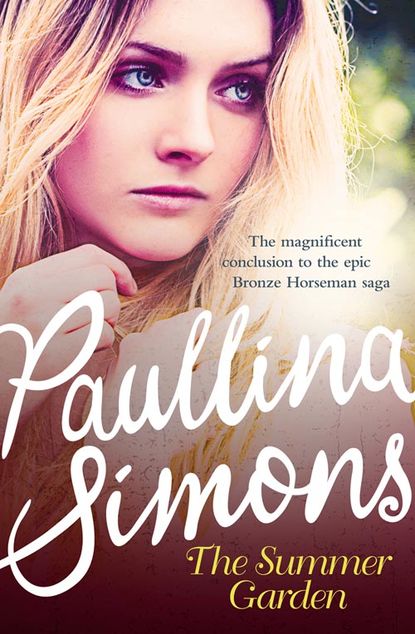По всем вопросам обращайтесь на: info@litportal.ru
(©) 2003-2025.
✖
The Summer Garden
Настройки чтения
Размер шрифта
Высота строк
Поля
“I don’t know. They’re not there.”
“Well, obviously. But what happened to them? Last summer they were here.”
“Fifteen summers they were here.”
“Fifteen summers,” Tatiana corrected herself, “and now new people have moved into their house? Next time you’re in town, stop by the local Soviet council and ask the Commissar what happened to the Pavlovs.”
“Are you out of your mind, such as it is? I’m going to the Soviet to ask where the Pavlovs went? Just eat, will you? Have the egg. Stop asking so many questions. I’m tired of you already and it’s only morning.”
Tatiana was sitting, cheeks like a chipmunk, the whole egg uneaten in her mouth, her eyes twinkling. Dasha laughed, pulling Tatiana to herself. Tatiana moved away. “Stay still,” said Dasha. “I have to rebraid your hair, it’s a mess. What are you reading now, Tanechka?” she asked as she started unbraiding it. “Anything good?”
“Queen Margot. It’s the best book.”
“Never read it. What’s it about?”
“Love,” said Tatiana. “Oh, Dasha—you’ve never dreamed of such love! A doomed soldier La Môle falls in love with Henry IV’s unhappy Catholic wife, Queen Margot. Their impossible love will break your heart.”
Dasha laughed. “Tania, you are the funniest girl I know. You know absolutely nothing about anything, yet talk in thrall of words of love on a page.”
“Obviously you’ve never read Queen Margot,” Tatiana said calmly. “It’s not words of love.” She smiled. “It’s a song of love.”
“I don’t have the luxury of reading about love. All I do is take care of you.”
“You leave a little time for some nighttime social interaction.”
Dasha pinched her. “Everything is a joke to you. Well, just you wait, missy. Someday you won’t think that social interaction is so funny.”
“Maybe, but I’ll still think you’re so funny.”
“I’ll show you funny.” Dasha knocked her back on the couch. “You urchin,” she said. “When are you going to grow up? Come, I can’t wait for your impossible brother anymore. Let’s go meet your new best friend, Mademoiselle Kantorova.”
Saika Kantorova.
The summer of 1938, when she turned fourteen, was the summer that Tatiana grew up.
The people who moved in next door were nomads, drifters from parts of the world far removed from Luga. They had odd Central Asian names. The father, Murak Kantorov, too young to be retired, mumbled that he was a retired army man. But his black hair was long and tied in a ponytail. Did soldiers have long hair like that? The mother, Shavtala, said she was a non-retired teacher “of sorts.” The nineteen-year-old son, Stefan, and the fifteen-year-old daughter, Saika, said nothing except to pronounce Saika’s name. “Sah-EE-ka.”
Was it true that they came from Turkmenistan? Sometimes. Georgia? Occasionally. The Kantorovs answered all questions with vagueness.
Usually new people were friendlier, not as watchful or silent. Dasha tried. “I’m a dental assistant. I’m twenty-one. What about you, Stefan?”
Dasha was already flirting! Tatiana coughed loudly. Dasha pinched her. Tatiana wanted to make a joke, but there didn’t seem to be any room for jokes in the crowded dark room where too many people stood awkwardly. The sun was blazing outside, yet inside, the unwashed curtains were drawn over the filthy windows. The Kantorovs had not unpacked their suitcases. The house had been left furnished by the Pavlovs, who seemed not so much to have left as to have stepped out.
There were some new things on the mantel. Photos, pictures, strange sculptures and small gilded paintings, like icons, though not of Jesus or Mary … but of things with wings.
“Did you know the Pavlovs?” asked Tatiana.
“Who?” the father said gruffly.
“The Pavlovs. This was their house.”
“Well, it’s not their house anymore, is it?” said the raven mother.
“They won’t be back,” said Murak. “We have papers from the Soviet. We are registered to stay here. Why so many questions from a child? Who wants to know?” He pretended to smile.
Tatiana pretended to smile back.
When they were outside, Dasha hissed, “Stop it! I can’t believe you’re already starting with your inane questions. Keep quiet, or I swear I’ll tell Mama when she comes.”
Dasha, Stefan, Tatiana and Saika stood in the sunlight.
Tatiana said nothing. She wasn’t allowed to ask questions.
Finally Stefan smiled at Dasha.
Saika watched Tatiana guardedly.
It was at that moment that Pasha, little and fast, ran up the steps of the house, shoved a bucket with three striped bass into Tatiana’s body and said loudly, “Ha, little smart Miss Know-it-nothing, look what I caught today—”
“Pasha, meet our new neighbors,” interrupted Dasha. “Pasha—this is Stefan, and Saika. Saika is your age.”
Now Saika smiled. “Hello, Pasha,” she said.
Pasha smiled broadly back. “Well, hello, Saika.”
“And how old are you?” Saika said, appraising him.
“Well, I’m the same age as this one over here.” Dark-haired Pasha pulled hard on Tatiana’s blonde braid. She shoved him. “We’re fourteen soon.”
“You’re twins!” exclaimed Saika, looking at them intently. “What do you know. Obviously not identical.” She smirked. “Well, well. You seem so much older than your sister.”
“Oh, he is so much older than me,” said Tatiana. “Nine minutes older.”
“You seem older than that, Pasha.”
“How much older do I seem, Saika?” Pasha grinned. She grinned back.
“Like twelve minutes older,” Tatiana grumbled, stifling the desire to roll her eyes, and “accidentally” tripping over the bucket, spilling his precious fish onto the grass. Pasha’s attention was loudly and properly diverted.
To wake up and be still with the morning, to wake up and feel the sun, to not do, to not think, to not fret. Tatiana lived in Luga unbothered by the weather, for when it rained she read, and when it was sunny she swam. She lived in Luga unbothered by life: she never thought about what she wore, for she had nothing, or what she ate, because it was always adequate. She lived in Luga in timeless childhood bliss without a past and without a future. She thought there was nothing in the world that a summer in Luga could not cure.
The Last Snow, 1946
“Mama, Mama!”
Shuddering she came to and swirled around. Anthony was running, pointing to the sloping hill, down which walked Alexander. He was wearing the clothes he left in.
Tatiana got up. She wanted to run to him, too, but her legs wouldn’t carry her. They couldn’t even support her standing. Anthony, the brave boy, jumped straight into his father’s arms.











